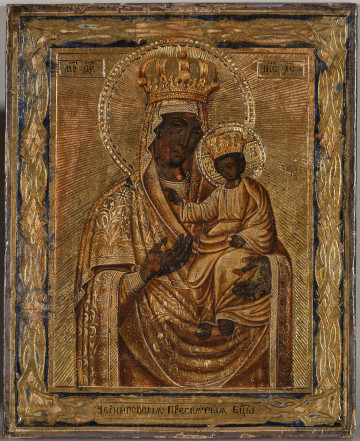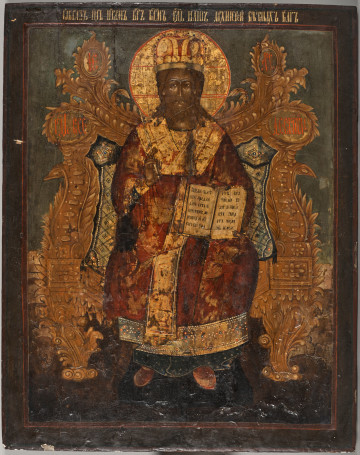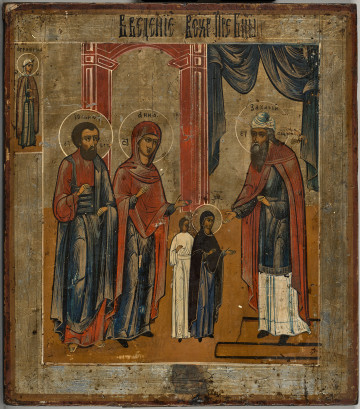
The Mother of God of Hodigitria
19th (?) century
Castle Museum in Łańcut
Part of the collection: Ikony
Multi-field icon, St. Nicholas, Theotokos Eleusa, St. Charalampus, Sts. Cyricus and Julitta. The tradition of making icons consisting of several depictions combined on one canvas board goes back a long time. Presumably, such icons appeared in Rus towards the end of the 14th c. The oldest ones known are from the 15th c.; they come from Veliky Novgorod, located in the northwest of Rus. Paintings of this type were readily used in households. They contained wonderworking and particularly revered images of the Mother of God, popular selected saints - intercessors in specific needs, or scenes from the gospels. On the presented icon, four images are depicted, counting from the upper left corner: St. Nicholas, Theotokos Eleusa, St. Charalampus, as well as Sts. Cyricus and Julitta. They are separated by the centrally placed depiction of the Crucifixion of Christ, crowned with the portrayal of the Lord of the Hosts - Yahweh Sabaoth, thoroughly described in the Cyrillic inscriptions and monograms (see S.12792-12795MŁ; S.12871MŁ; S.12872MŁ; S.12875MŁ); its content complements the other portrayals. St. Nicholas the Wonderworker was addressed with practically every need, especially the difficult ones (see S.12683MŁ; S.12820MŁ). Before the image of the Theotokos Eleusa in the Salvation of the Lost iconographic type, one would pray for those without hope for salvation and those who abandoned the Church (see S.12682MŁ). St. Charalampus was the bishop of Magnesia on the Maeander in Asia Minor. He was martyred in 202, at the age of 113, during the time of Septimius Severus. He was the patron saint protecting from sudden, unexpected death, especially without absolution, as well as the protector of cattle (see S.12799MŁ). Sick children are entrusted to the care of St. Julitta and her three-year-old son Cyricus, who were martyred during the time of Diocletian (see S.2798MŁ). Teresa Bagińska-Żurawska https://orcid.org/0000-0002-9243-3967
Dimensions
height: 35.5 cm, width: 26.5 cm
Object type
Icons
Technique
gilding, tempera
Material
gold, tempera, wood
Origin / acquisition method
decyzja administracyjna
Creation time / dating
Creation / finding place
Owner
Castle Museum in Łańcut
Identification number
Location / status

19th (?) century
Castle Museum in Łańcut

1800 — 1850
Castle Museum in Łańcut

1800 — 1899
Castle Museum in Łańcut
DISCOVER this TOPIC
Museum of King Jan III's Palace at Wilanów
DISCOVER this PATH
Educational path